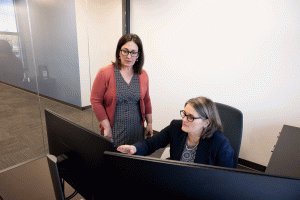Clinical trial monitoring
More than source data verification
 Monitoring
Monitoring
Clinical trial monitoring is a constantly evolving field, now encompassing various approaches that work together to ensure the safety of human subjects in clinical trials. These include centralized, remote, risk-based, safety, medical, and ethics monitoring, each varying in distinct responsibility and contribution to the study. Safety, medical, and ethics monitoring strategies are conducted by designated committees and investigators. This blog will explore compliance monitoring, which includes centralized, on-site, or remote monitoring using risk-based approaches.
What is Monitoring?
Monitoring involves reviewing and validating study documentation to ensure data integrity and patient safety in accordance with regulatory requirements and study protocols. These surveillance activities are conducted continuously throughout the duration of each study. The frequency of these checks may vary based on the specific study protocol, the drug or device included in the clinical study, the performance of the investigative sites, etc. and is outlined in the monitoring plan.
Which Regulations Apply to Monitoring?
ISO 14155 and Good Clinical Practice (GCP) guidelines provide the framework for establishing monitoring standards in clinical studies involving medical devices as mandated by various national regulatory authorities. Other US specific regulatory requirements for monitoring include 21 CFR 312 (pharmaceuticals) and 21 CFR 812 (medical devices). This blog will focus on monitoring regulations for the US.
Selecting a Monitor
Before the monitoring process can commence, several essential preparatory steps must occur. One of the initials steps involves the selection of well-trained, knowledgeable monitors, who possess expertise in study protocols, regulations, and essential documents. Monitors are independent of investigational sites and receive training according to the sponsor’s quality management procedures. Guidelines for choosing a monitor are outlined in 21 CFR 312.53(d) and 21 CFR 812.43(d). Monitors assume a variety of responsibilities during the course of a study and should possess attributes such as attention to detail, inquisitiveness and ability to discuss difficult issues with study personnel.
Developing a Monitoring Plan Using Risk-Based Monitoring
Upon the selection of a monitor, a comprehensive monitoring plan needs to be developed. The most recent revision to GCP and ISO 14155 includes a risk-based monitoring approach. This process involves formulating a monitoring plan based on a risk assessment of critical data and processes. A monitoring template that offers valuable guidance in designing and integrating risk factors is provided by the US National Institutes of Health. Risk-based monitoring focuses on the big picture of each process within a study and identifies areas where risk may need to be mitigated, and resources and time that may need to be allocated. The most effective monitoring plan includes a combination of monitoring approaches (centralized, and on-site or remote/virtual) and the flexibility to make changes to mitigate patient risk.
Quality of Monitoring
Our monitoring white paper includes a list of items for monitors to use during investigational site visits to ensure essential documentation is in place and in compliance with regulations, as well as to evaluate the quality of data collection and study management. The quality of monitoring is essential to the safety of participants in clinical trials. Monitors are expected to detect all issues requiring queries and follow up with appropriate study personnel to ensure their resolution. They are additionally responsible for identifying potential issues and communicating with both site and sponsor personnel. This ensures that proactive measures are taken to address any concerns, minimize errors, to uphold the study timeline, and most importantly ensure patient safety.
MED Institute offers a variety of clinical trial services including monitoring and is a full-service CRO. We have over 35 years of experience designing and executing clinical trials, ranging from early feasibility studies to multinational, controlled pivotal trials to post-market registries.
Contact us today to start your project discussion. 855.463.1633 | askmed@medinstitute.com | medinstitute.com
Get email about news, services, and events from MED Institute.
OUR COMMITMENT
We are committed to consistently performing services with high quality, that deliver exceptional results, and add value to the client’s business.
For client surveys sent in 2024, we received ratings of 4.98/5 points (13).
